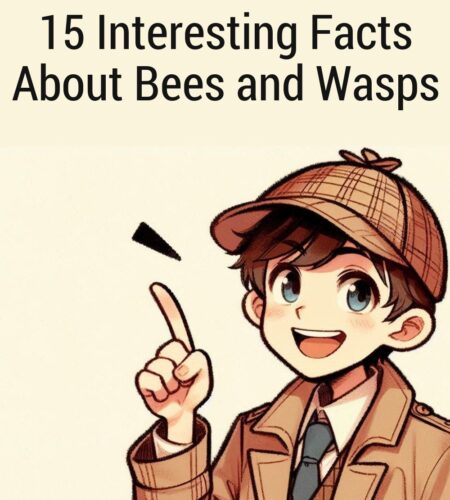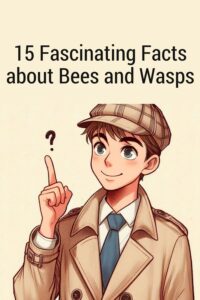Introduction:
Bees and wasps play an integral role in our ecosystem. They help to pollinate plants, produce honey, and provide a natural form of pest control. Despite the fact that most of us have heard something about them, there are many interesting facts about bees and wasps that many of us may not know. In this article, we explore fifteen of the most interesting facts about bees and wasps.
Fact 1: Bees Have Been Around For Over 140 Million Years
Bees have been around for more than 140 million years, making them one of the oldest groups of living insects. The earliest bee-like species were first discovered during the period of the Early Cretaceous. This means that today’s bees are almost identical to their ancient ancestors.
Fact 2: Wasps Have Been Around For Over 70 Million Years
Wasps have also been around for an incredibly long time. These insects are estimated to have appeared more than 70 million years ago, making them one of the oldest groups of living insects. The earliest wasp-like fossils date back to the Upper Jurassic period.
Fact 3: Bees Are Vegetarians
Bees are strict vegetarians and feed on nectar and pollen from flowers. By collecting these sugary substances from their environment, bees can produce honey and use it for food. Nectar and pollen also provide bees with the necessary proteins, vitamins, and minerals for their survival.
Fact 4: Wasps Are Carnivores
Wasps, on the other hand, are carnivores and mainly feed on small invertebrates like flies, caterpillars, and aphids. They also feed on nectar, but it serves merely as an energy source, since it doesn’t provide them with the proteins and vitamins they need for their survival.
Fact 5: Bees Are Color Blind
Bees can’t see the full range of colors and are color blind. They are, however, able to detect ultraviolet light and use it to distinguish between different types of flowers. This ability allows them to locate the most nectar and pollen-rich flowers in their environment more easily.
Fact 6: Wasps Have Poor Vision
Unlike bees, wasps have very poor vision and rely primarily on smell and other senses. This isn’t too surprising, since wasps are predators that mainly hunt for small invertebrates that don’t move quickly and are easier to locate by smell than by sight. Interestingly, wasps have much better night vision than bees.
Fact 7: Most Bees Are Solitary
Most bees are solitary and live on their own. These bees don’t build nests and don’t belong to a colony. Instead, they create small burrows in the ground for shelter and to lay their eggs. Interestingly, solitary bees don’t produce honey and rarely sting.
Fact 8: Most Wasps Are Social
Unlike most bees, most wasps are social and live in colonies. These insects typically build massive nests made of paper or mud and each colony consists of a single queen and hundreds of workers. The queen is in charge of laying eggs and the workers hunt for food and take care of the larvae.
Fact 9: Bees Communicate Through Dance
Bees are well-known for their remarkable communication skills and use a unique dance language to share information with one another. Depending on the type of message, a bee will perform a certain pattern of movements to share information about the location of nectar, pollen, or water with the other members of the colony.
Fact 10: Wasps Communicate Through Body Movements
Wasps also have a unique form of communication that relies on body movements. When threatened, wasps will raise their wings or sting to signal danger to members of their colony. They also use body movements to communicate the location of food and water sources.
Fact 11: Bees Have an Amazing Sense of Smell
Bees have an amazing sense of smell and can detect the slightest scent of nectar or pollen from miles away. They can smell the difference between two different types of flowers and will choose the one that produces the most nectar. This sense also allows them to differentiate between different species of flowers and between flowering plants and non-flowering plants.
Fact 12: Wasps Have an Unbelievably Accurate Sense of Smell
Wasps also have an incredibly accurate sense of smell. These insects are able to quickly locate small prey, such as aphids and caterpillars, by detecting their scent. This sense also allows wasps to quickly locate potential food sources and the entrances to their nest.
Fact 13: Honeybees Have an Incredible Memory
Honeybees have an incredible memory and can remember the exact location of flowers they have visited in the past. They also remember the route they took to reach these flowers and can quickly find their way back. This allows them to collect the most nectar and pollen in the shortest amount of time.
Fact 14: Wasps Are Good Problem Solvers
Wasps have also been shown to possess a remarkable cognitive ability. Studies have shown that these insects can work together to solve complex tasks and remember the solutions for future use. This allows them to quickly adapt to their environment and find new sources of food and shelter.
Fact 15: Bees and Wasps Are Beneficial Insects
Although bees and wasps can be intimidating, these insects are actually extremely beneficial to our environment. Bees help to pollinate flowers and produce honey, while wasps provide a natural form of pest control by eating small invertebrates. Both of them are a vital part of our ecosystem and deserve our respect.
Conclusion
Bees and wasps are some of the most fascinating creatures on the planet. From their incredible cognitive abilities to their invaluable role in our ecosystem, there is so much to learn about these amazing insects. The fifteen facts outlined here offer just a glimpse of the amazing qualities possessed by these remarkable species.
Subscribe to our email newsletter to get the latest posts delivered right to your email.




Comments